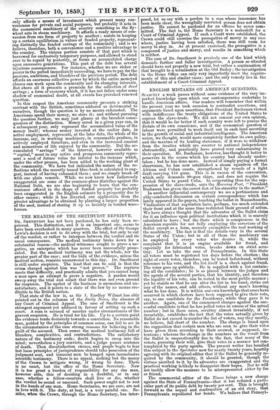THE MEANING OF THE SMETHURST REPRIEVE. DR. SMETHURST has not
been pardoned, he has only been re- prieved. This distinction, and it is an important one, seems to have been overlooked in many quarters. The effect of Sir George Lewis's decision is not to do away with the trial, but only to out off the verdict, or rather to interpose between the verdict and its usual consequence. The medical testimony broke down for a substantial reason—the medical witnesses sought to prove a ne- gative, an enterprise which has never been successfully prose- cuted. But the medical testimony was not the whole, nor the greater part of the case ; and the bulk of the evidence, minus the medical section, remains unanswered to this day. Dr. Smethurst is still under suspicion. The least that can be said is that the crime charged against him was "not proven." The reprieve meets that difficulty, and practically admits that you cannot hang a man upon an attempt to prove a negative. A pardon would sweep away the trial and admit that there was not even ground for suspicion. The upshot of the business is anomalous and un- satisfactory, and it points to a state of the law by no means cre- ditable to the British nation.
That state of the law is, as Sir J. Eardley Wilmot has ably pointed out in the columns of the Daily News, the absence of any Court of Criminal Appeal. The case of Smethurst is the strongest argument yet adduced in favour of setting up such a court. Amen is accused of murder under circumstances of the gravest suspicion. He is tried for his life. Up to a certain point the evidence tends decisively towards a conviction. No reasonable man, guided by the principles of common sense, can fail to see in the circumstances of the case strong reasons for believing in the guilt of the accused. Then comes the medical testimony full of blunders, complexities, and contradictions. The satisfactory nature of the testimony ends ; doubt begins to creep into the mind; nevertheless a jury convicts, and a judge passes sentence of death. Then dissatisfaction ensues, and people begin to fear lest loose principles of jurisprudence should take possession of the judgment seat, and innocent men be hanged upon inconclusive scientific testimony. There is no appeal, nothing but the mercy of the Crown to mitigate wrong, if wrong be done. There is no court, but the office of the Home Secretary. Now it is too great a burden of responsibility for any one man, however able, this of deciding in a doubtful, or in any case, whether a fellow-creature shall live or die, whether the verdict be sound or unsound. Such power ought not to rest In the hands of one man. Home Secretaries, we are sure, are not in love with it. The duty, at best, is a very painful one. Be- sides, when the Crown, through the Home Secretary, has inter-
posed, let us say with a pardon in a ease where innocence has been made clear, the wrongfully convicted person does not obtain justice. He cannot be pardoned for an offence he never com- mitted. The fact is, the Home Secretary is a makeshift for a Court of Criminal Appeal. If such a Court were established, the Crown could still exercise the prerogative of mercy in any case where, justice having been satisfied, there was still room for mercy to step in. As at present exercised, the prerogative is a compound of justice and mercy, and results in something which is neither.
The case of Dr. Smethurst is precisely one of the kind which demands further and fuller investigation. I person so situated should have not properly a new trial, but rather a continuation of that brought to a termination at the Old Bailey ; the investigation in the Home Office can only very imperfectly meet the reoluire- ments of this and similar cases ; and the only remedy lies in the establishment of a Court Criminal Appeal.


























 Previous page
Previous page